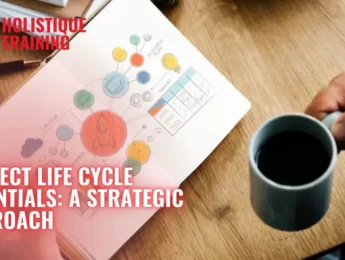The world of project management is both dynamic and demanding. Every project, regardless of its size or complexity, must come to a proper conclusion – a process known as project closure. This phase may not receive as much attention as the planning and execution stages, but its significance cannot be overstated. Project closure is the final touch that transforms a successful project into a valuable learning experience. In this blog post, we will explore the critical aspects of project closure, its importance, and provide a comprehensive guide on mastering the seven essential steps for a seamless project closure.
What Is Project Closure in Project Management?
Project closure is the culmination of the entire project management process. It is the final phase that formally concludes the project by ensuring that all its objectives have been met, deliverables have been produced, and resources are properly released. This phase involves a series of activities that help assess the project's overall success, draw essential conclusions, and identify opportunities for improvement in future endeavours.
Importance of Closing a Project
Project closure is more than just a formality; it serves several crucial purposes that contribute to an organisation's long-term success and growth. Let's delve into the key reasons why project closure is of utmost importance:
Final Validation of Project Success
Closing a project allows stakeholders to review whether the project has achieved its intended goals and objectives. This validation is critical in determining if the project's outcomes align with the initial scope and if any adjustments are required.
Resource Management
Proper project closure ensures the timely release of resources, both human and financial. This process frees up valuable resources for allocation to other projects or initiatives, thereby maximising organisational efficiency.
Table 1: Benefits of effective project closure
Benefits | Description |
Continuous Improvement | Lessons learned drive future project enhancements. |
Enhanced Stakeholder Relations | Positive closure experiences bolster stakeholder confidence. |
Resource Optimisation | Efficient resource allocation for future projects. |
Risk Mitigation | Proactive handling of potential issues ensures smooth closure. |
Boosted Team Morale | Recognition fosters pride, encouraging future excellence. |
Lessons Learned
The closure phase presents a valuable opportunity to analyse the entire project lifecycle, identifying successes and challenges. Documenting lessons learned facilitates knowledge transfer, fostering continuous improvement across future projects.
Stakeholder Satisfaction
Effective project closure involves obtaining feedback from stakeholders and addressing any concerns or feedback they may have. This fosters positive relationships and enhances the organisation's reputation.
Legal and Contractual Obligations
For projects involving external partners or clients, closure ensures that all contractual obligations have been fulfilled, protecting the organisation from potential legal issues.
Team Recognition and Morale
Closing a project provides a platform to acknowledge the efforts of the project team, boosting morale, and encouraging a sense of accomplishment and camaraderie.
Importance of Having a Management Process Before Project Closure
A well-defined management process before project closure is a crucial aspect that significantly contributes to reducing project fail rates. In fact, according to TeamStage, a significant proportion of projects, approximately 70%, fail to meet their promised deliverables, leaving customers dissatisfied. Nevertheless, the introduction of a well-structured management process has proven to be effective in drastically reducing the failure rate to 20% or even lower. While project closure marks the end of a project's execution, it is not the time to relax, but rather a time to ensure that all loose ends are tied up and that the project's objectives have been met. By having a robust management process in place before closure, project managers can mitigate risks, address potential issues proactively, and enhance the overall success rate of projects. Let's delve into the reasons why a solid management process is essential before project closure:
Risk Mitigation
In the early stages of project planning and execution, project managers identify and assess potential risks that may impact the project's success. However, unforeseen risks can still emerge during the project lifecycle. By having a management process in place before closure, project managers can reevaluate risks and take necessary actions to mitigate them effectively.
This process involves conducting a final risk assessment, identifying any new risks that may have arisen, and developing strategies to address them. By proactively managing risks during the closure phase, project managers can prevent last-minute surprises and increase the likelihood of a successful project outcome.
Issue Resolution
Projects often encounter challenges and issues during execution, and some may remain unresolved until the closure phase. Having a management process in place ensures that these issues are not ignored or neglected but are actively addressed and resolved.
During the pre-closure management process, project managers should conduct a thorough review of unresolved issues. Collaborate with the project team and stakeholders to determine appropriate solutions and implement corrective actions. Addressing issues promptly prevents them from escalating and impacting the overall project success.
Stakeholder Engagement
Maintaining positive stakeholder relationships throughout the project lifecycle is vital. However, it is equally essential to keep stakeholders engaged during the closure phase. A well-defined management process enables project managers to communicate effectively with stakeholders, seeking their input and feedback on the project's final outcomes.
Engaging stakeholders during closure fosters a sense of ownership and satisfaction, as they are given the opportunity to provide valuable insights and have their concerns addressed. This engagement builds trust and enhances the likelihood of continued support for future projects.
Resource Optimisation
As the project draws to a close, it is essential to evaluate resource utilisation and optimise them for future projects. A management process before closure involves assessing resource allocation, analysing resource performance, and identifying opportunities for improvement.
By analysing resource allocation data, project managers can identify any areas of inefficiency and take measures to optimise resource allocation in future projects. This optimisation ensures that resources are utilised to their maximum potential, leading to cost savings and improved project performance.
7 Steps to Closing a Project
Now that we understand the significance of project closure and having a management process in place beforehand, let's dive into the seven critical steps that will help you master the project closure process:
Step 1: Verify Completion of Deliverables
The first step in project closure is to verify that all project deliverables have been successfully completed and meet the predefined acceptance criteria. This involves a thorough review of the project scope to ensure that no key components have been overlooked.
As a project manager, it is crucial to collaborate closely with the project team and stakeholders to confirm that all objectives have been achieved to the required standards.
Step 2: Conduct a Comprehensive Review
A comprehensive review or final audit of the entire project is an integral part of the closure process. This review should encompass all aspects of the project, including its goals, timeline, budget, risks, and performance metrics. By conducting a thorough analysis, you can identify areas of success and areas that may require improvement in future projects.
During the review, encourage open feedback from the project team and stakeholders to gain a holistic perspective on the project's strengths and weaknesses.
Step 3: Obtain Stakeholder Feedback
Gathering feedback from stakeholders is a vital step in gauging the project's success and overall impact. Surveys, interviews, or focus groups can be employed to capture their insights and perspectives.
Consider questions that explore stakeholder satisfaction, the effectiveness of communication channels, and whether the project outcomes align with their expectations. Addressing any concerns promptly demonstrates your commitment to stakeholder needs and fosters stronger relationships.
Step 4: Tie Up Loose Ends
Project closure entails tying up any loose ends to ensure a smooth transition from project completion to post-project operations. This may involve finalising contracts, ensuring all documentation is complete, archiving project records, and conducting final financial assessments.
Moreover, this is an opportune moment to address any outstanding issues or pending tasks that were deferred during the project execution phase.
Step 5: Celebrate Success and Recognise Contributions
Recognising the efforts of the project team and celebrating success is essential for team morale and cohesion. A closing ceremony or team event can be organised to acknowledge individual contributions and achievements.
Highlighting team members' dedication and hard work not only boosts their spirits but also motivates them to strive for excellence in future projects.
Step 6: Document Lessons Learned
One of the most valuable aspects of project closure is capturing lessons learned. Encourage the project team to share their insights, challenges, and best practices experienced during the project.
Compile these lessons into a comprehensive document that serves as a reference for future projects. By learning from both successes and setbacks, your organisation can continuously improve its project management practices.
Step 7: Finalise Project Closure Documentation
As the final step in the closure process, ensure all project closure documentation is completed and archived appropriately. This includes creating a final project report that summarises the entire project lifecycle, from initiation to closure.
The report should encompass key performance indicators, milestones achieved, challenges overcome, and the overall impact of the project on the organisation's objectives.
How to Become Better at Closing a Project
Project closure is not a one-and-done task; it is a continuous process of refinement and improvement. To enhance your proficiency in closing projects, consider implementing the following strategies:
Emphasise Communication
Effective communication is the bedrock of successful project closure. Throughout the project lifecycle, maintain open and transparent channels of communication with all stakeholders. Regularly update them on progress, milestones, and potential changes to manage expectations effectively. Clear and consistent communication fosters trust, minimises misunderstandings, and ensures everyone is on the same page.
Additionally, encourage a culture of feedback within the project team. Seek input from team members on the closure process and encourage them to share their observations and suggestions for improvement. Creating a safe space for open communication empowers team members to contribute their insights, fostering a sense of ownership and investment in the project's success.
Cultivate a Learning Culture
Project closure provides a golden opportunity to learn from both successes and setbacks. Cultivating a learning culture within the organisation encourages project teams to reflect on their experiences and actively seek areas for improvement.
Conduct post-project reviews with the project team to discuss what went well, what could have been done differently, and any unforeseen challenges faced. Encourage team members to share their perspectives openly and constructively, without fear of blame or judgement. Celebrate successes while acknowledging areas for improvement, making sure the focus remains on learning and growing together as a team.
Standardise Closure Procedures
Consistency is key when it comes to project closure. Develop standardised procedures for the closure process to ensure that every project undergoes the same meticulous review. Standardisation helps create a clear roadmap for project managers and team members to follow, leaving no room for important closure steps to be missed.
Consider creating a project closure checklist that outlines the essential tasks to be completed during the closure phase. This checklist can include verifying deliverables, conducting stakeholder feedback sessions, documenting lessons learned, and archiving project records. Tailor the checklist to suit your organisation's unique project requirements while ensuring it covers all critical aspects of closure.
Implement Feedback Mechanisms
Obtaining feedback is not limited to the closure phase alone; it should be a consistent part of the project management process. Implement feedback mechanisms throughout the project's duration to capture stakeholder insights, project team observations, and potential areas for improvement.
Utilise various tools like surveys, focus groups, or one-on-one interviews to gather feedback from stakeholders. Analyse the feedback received and use it to make informed decisions during the project's execution. This proactive approach ensures that potential issues are addressed early, reducing the likelihood of major challenges during the closure phase.
Invest in Project Management Training
Project managers and team members play critical roles in the project closure process. Investing in project management training and certifications equips them with the knowledge and skills needed to navigate project closure effectively.
Consider providing training in areas like communication and interpersonal skills, stakeholder management, risk assessment, and lessons learned documentation. These competencies will not only benefit the closure process but also enhance the overall project management capabilities of the organisation.
The Psychology of Project Closure
Beyond the paperwork and process, project closure holds a profound psychological impact on the individuals involved. Acknowledgment and closure are intertwined, creating a circle of positive reinforcement that drives future successes. Understanding the psychology behind project closure can profoundly influence how project managers approach this phase, enhancing its effectiveness.
Closure as Emotional Validation
Project closure serves as emotional validation for the project team. Recognising and appreciating their efforts validates their hard work, fostering a sense of accomplishment and pride. This emotional reinforcement acts as a powerful motivator, encouraging team members to invest the same level of dedication in future projects.
Closure Rituals and Their Impact
Closure rituals, whether it's a team celebration, a formal recognition event, or a simple acknowledgment meeting, have a significant impact. They provide closure not just to the project but also to the individuals involved. These rituals create a sense of finality, allowing team members to mentally move on to the next challenge. Moreover, these events serve as platforms for expressing gratitude and acknowledging individual contributions, building a positive team culture.
Closure as a Learning Opportunity
Closure isn't just about looking back; it's about looking forward. Encouraging team members to reflect on their achievements and challenges during closure fosters a learning environment. By openly discussing what worked and what didn't, team members can collectively brainstorm strategies for improvement. This reflective practice transforms closure into a proactive tool for enhancing future projects, making it an integral part of the organisation's continuous improvement cycle.
The Role of Technology in Project Closure
In today's digital age, technology plays a pivotal role in every aspect of project management, including closure. In fact, according to Quixy, it is anticipated that the project management software sector will exhibit a Compound Annual Growth Rate (CAGR) of 10.67%, reaching a substantial value of $10 billion by the year 2026. Leveraging technology not only enhances the efficiency of closure processes but also revolutionises knowledge management, ensuring that organisational learning is streamlined and accessible.
Digital Documentation and Archiving
Digital platforms facilitate seamless documentation and archiving. Project reports, feedback data, and lessons learned can be stored in secure, easily accessible databases. This not only ensures that critical information is preserved but also simplifies the process of sharing knowledge with relevant stakeholders. Version control and data integrity are maintained, enhancing the reliability of the stored information.
Automated Surveys and Feedback Loops
Gathering stakeholder feedback is integral to closure, and technology streamlines this process. Automated survey tools enable the quick collection of feedback data. Real-time analytics provide immediate insights, allowing project managers to address concerns promptly. Additionally, continuous feedback loops can be established, ensuring that stakeholder input isn't limited to project closure but is an ongoing process, facilitating proactive issue resolution.
Table 2: How technology aids in project closure
AI-Powered Insights and Predictive Analysis
Artificial Intelligence (AI) and machine learning algorithms can analyse vast datasets from past projects. These analyses provide valuable insights into historical project closures, identifying patterns and trends. Predictive analysis based on this data equips project managers with foresight, enabling them to anticipate potential challenges and proactively implement strategies for effective closure. AI-driven tools also aid in identifying areas of improvement, turning past project data into actionable knowledge.
By integrating these technological advancements into project closure processes, organisations not only enhance the efficiency of closure but also create a robust knowledge ecosystem. This ensures that every project's closure isn't just an endpoint but a stepping stone toward a smarter, more efficient future.
Conclusion
In conclusion, the project closure process is the culmination of a project's journey and holds tremendous importance in ensuring its overall success. By following the seven essential steps outlined in this blog post, project managers can navigate the closure phase seamlessly and leverage its benefits for continuous improvement.
Remember, project closure is not merely a checkbox to tick off; it is an opportunity to celebrate achievements, learn from experiences, and set the stage for future triumphs. Embrace project closure as a valuable phase in the project management lifecycle, and your organisation will reap the rewards of efficient, successful projects that drive sustainable growth.
If you're eager to enhance your project management expertise and master essential planning and scheduling skills, make sure to check out our course, ‘Essential Planning & Scheduling Skills for Successful Project Management.’ This course will empower you to navigate the complexities of project closure confidently, ensuring that your projects consistently deliver on their promises and lead to greater organisational success. Don't miss this opportunity to elevate your project management capabilities and join the ranks of successful project managers!














